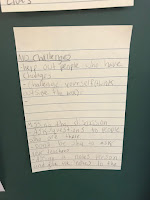This year I have started working for McHugh at CHEO. It is a job that is very unique in comparison to my other 22 years of teaching experiences. This job excited me as I was entering a whole new level of supporting mental health and academics. An opportunity to continue to learn and grow as an educator. What I didn't expect to find was my math phobia.
As an elementary teacher I loved teaching math. I loved helping students find various ways to understand math and to see math in the world around them. I loved guiding and questioning students to see cross curricular connections and real world applications. And then I started working at McHugh CHEO. Where the student consistency changed, the math was now high school level and I was unprepared for my own self doubt and anxiety around teaching math.
Now, let me just give you a clear idea on how our classroom is different than the average classroom. In our classroom we work with students for a short period of time, anywhere from one day, a few days, to possibly, and not often, a month. Students are usually working on curriculum that is planned by their home school classroom teacher. So, they can come in working on any subject and any area within that subject. So, math can be any grade level and any area of math on any given day. Unlike teaching a consistent group of students that you get to plan and implement the curriculum for, I am working on the fly. So, it is essential to have a comfort level in grade 9-12 math that can allow me to be adaptable. That is my journey.....
I decided that working on math was an essential area as I had the least amount of flexible thinking in this area due to, 1. lack of prior math knowledge. 2. anxiety over getting the math wrong, and 3. being under pressure to know the concepts now in order to support the students. So here I am, starting this journey.
Math -Where To Start, became the title of my blog, because I had to take a personal reflective journey on my math level and experience in order to get my math inquiry started. I had to let go of the idea that I can learn this by reading a book, or by working with the students, but to start by honestly identifying what grade level my math skills become uncomfortable. (A humbling experience). I needed to admit that the work starts with me. I realized I needed to go back to grade 8 math.
So, I started my journey working my way through understanding multiplying and dividing fractions with like and unlike denominators. If I am honest, it was driven by the fact that I was working with a student who required a lot of math support and I had to work through my initial fear in order to support his learning. I started by allowing the student to know that I had to work it out with him as I was learning along with him. (This sounds easy, but it feels very vulnerable to admit you do not know to a student). So, I used what I am good at, which is being resourceful and finding solutions to problems, and I found videos that covered the concepts we were learning. (I am thankful for the vast amount learning videos online now. They are like having another teacher in the room).
I found I learned the concepts quickly as it made more sense to me because I had real world experiences to connect to the learning. Which then freed me up from my anxiety to support the student who needed more time to understand the concepts. I could then offer more than one way to teach the concepts in hopes that one way would connect to the student learning. I felt like I had approached step one to eliminating, or at least decreasing, my math anxiety.
Now I have set myself the goal to use MathSpace to work my way through the grade 8 Ontario Math Curriculum starting with understanding integers and moving onto understanding exponents. While learning these concepts I may discover other math concepts I need to understand. I would also like to challenge myself by working through math problems that require me to practice various math concepts in one problem. Challenge accepted......
My next blog will document the good, the bad, and the ugly, as I continue on my math learning journey.








